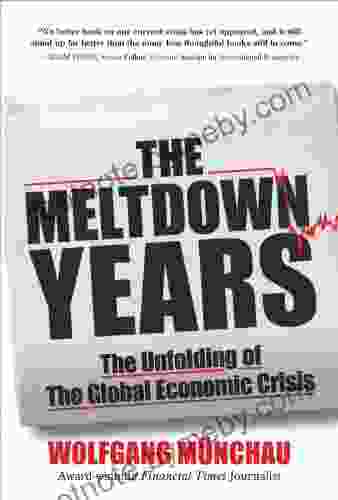Unraveling the Enigma: The Global Economic Crisis

Unveiling the Unseen Forces
The global economic crisis that erupted in 2008 shook the world to its core. It was a crisis that no one saw coming, a financial earthquake that sent shockwaves across the globe, leaving behind a trail of economic devastation and social upheaval.
4 out of 5
| Language | : | English |
| File size | : | 1116 KB |
| Text-to-Speech | : | Enabled |
| Enhanced typesetting | : | Enabled |
| Word Wise | : | Enabled |
| Print length | : | 273 pages |
| Screen Reader | : | Supported |
This article delves into the intricate web of events that led to this devastating crisis, exploring the underlying causes and consequences that continue to reverberate throughout the world. By understanding the genesis and impact of the crisis, we can gain valuable lessons to prevent future financial meltdowns and safeguard the stability of our economies.
The Genesis of the Crisis: A Perfect Storm of Misguided Policies
The seeds of the global economic crisis were sown over a decade before the actual meltdown. A confluence of misguided policies and reckless lending practices created a perfect storm that ultimately culminated in the financial disaster.
Subprime Mortgages: A Ticking Time Bomb
At the heart of the crisis lay the subprime mortgage market. These high-risk loans were granted to borrowers with poor credit histories and low income. Enticed by the promise of homeownership, many individuals took on mortgages they could ill afford.
Banks and other financial institutions packaged these subprime mortgages into complex financial instruments known as collateralized debt obligations (CDOs). These CDOs were then sold to investors around the world, who were lured by high returns and the perceived safety of these supposedly diversified products.
Lax Regulation and the Illusion of Stability
Lax regulation played a significant role in exacerbating the crisis. Financial institutions were allowed to operate with reckless abandon, taking on excessive risk without adequate capital reserves. Regulators failed to adequately supervise the financial markets, fostering a false sense of stability.
The credit rating agencies, whose job it was to assess the risk of these financial instruments, also failed in their duty. They issued overly optimistic ratings for CDOs, giving investors a false sense of security.
The Unfolding Disaster: A Domino Effect of Failures
In 2007, the subprime mortgage market began to unravel. As homeowners defaulted on their loans, the value of the underlying CDOs plummeted, triggering a chain reaction throughout the financial system.
Lehman Brothers: The Fall of a Giant
The collapse of the investment bank Lehman Brothers in September 2008 marked a pivotal point in the crisis. Lehman Brothers was one of the largest and most respected financial institutions in the world. Its failure sent shockwaves through the global financial system, causing a loss of confidence and a liquidity crisis.
The Great Recession: A Global Economic Slump
The failure of Lehman Brothers and the ensuing financial turmoil led to a sharp contraction in economic activity around the world. The global economy plunged into a deep recession, with GDP growth plummeting and unemployment rates soaring.
The crisis had a devastating impact on individuals, families, and businesses. People lost their jobs, homes, and savings. Businesses closed their doors, and governments struggled to cope with the mounting financial burden.
Aftermath and Lessons Learned: Rebuilding the Financial System
The global economic crisis had a profound and lasting impact on the world. In its wake, governments and financial institutions implemented a series of reforms to address the failures that led to the crisis and prevent future meltdowns.
Financial Regulation: Striking a Balance
One of the most important lessons learned from the crisis was the need for stricter financial regulation. Regulations were tightened to limit excessive risk-taking, strengthen capital requirements, and improve oversight of the financial markets.
The Dodd-Frank Wall Street Reform and Consumer Protection Act, passed in the United States in 2010, is one example of comprehensive financial reform. This law aims to prevent future crises by regulating the financial sector, protecting consumers, and promoting transparency.
International Cooperation: A Global Response
The global economic crisis also highlighted the need for increased international cooperation. The crisis demonstrated that financial instability in one country can have far-reaching consequences for the entire global economy.
The Group of Twenty (G20) has emerged as a key platform for international cooperation on financial regulation. The G20 has implemented a series of measures to strengthen the global financial system, including the Basel III Accord, which sets stricter capital requirements for banks.
: Lessons from the Past, Resilience for the Future
The global economic crisis was a profound and painful experience for the world. However, it also served as a catalyst for much-needed reforms to the financial system.
By understanding the causes and consequences of the crisis, we can increase our resilience to future financial shocks. Stricter regulation, international cooperation, and sound economic policies are essential elements in safeguarding the stability of our economies and ensuring the well-being of our societies.
While the scars of the global economic crisis remain, we must look to the future with optimism. By embracing the lessons learned, we can prevent future meltdowns and create a more sustainable and equitable global financial system.
4 out of 5
| Language | : | English |
| File size | : | 1116 KB |
| Text-to-Speech | : | Enabled |
| Enhanced typesetting | : | Enabled |
| Word Wise | : | Enabled |
| Print length | : | 273 pages |
| Screen Reader | : | Supported |
Do you want to contribute by writing guest posts on this blog?
Please contact us and send us a resume of previous articles that you have written.
 Book
Book Novel
Novel Page
Page Chapter
Chapter Text
Text Story
Story Genre
Genre Reader
Reader Library
Library Paperback
Paperback E-book
E-book Magazine
Magazine Newspaper
Newspaper Paragraph
Paragraph Sentence
Sentence Bookmark
Bookmark Shelf
Shelf Glossary
Glossary Bibliography
Bibliography Foreword
Foreword Preface
Preface Synopsis
Synopsis Annotation
Annotation Footnote
Footnote Manuscript
Manuscript Scroll
Scroll Codex
Codex Tome
Tome Bestseller
Bestseller Classics
Classics Library card
Library card Narrative
Narrative Biography
Biography Autobiography
Autobiography Memoir
Memoir Reference
Reference Encyclopedia
Encyclopedia David J Chalmers
David J Chalmers David H Ross
David H Ross David Menconi
David Menconi David Berry
David Berry Mohamedou Ould Slahi
Mohamedou Ould Slahi Dawn Loring
Dawn Loring David Nahmani
David Nahmani Deborah Hautzig
Deborah Hautzig David Cannadine
David Cannadine Debbie Elicksen
Debbie Elicksen Julia Child
Julia Child David Leiser
David Leiser Clare Keyes
Clare Keyes Creek Stewart
Creek Stewart David Rohde
David Rohde David Travis
David Travis Aleatha Romig
Aleatha Romig Deborah Kogan Ray
Deborah Kogan Ray David Enterprises
David Enterprises Brandon Varnell
Brandon Varnell
Light bulbAdvertise smarter! Our strategic ad space ensures maximum exposure. Reserve your spot today!

 DeShawn PowellEscape into the Heartbreaking and Hopeful World of Loveless by Alice Oseman
DeShawn PowellEscape into the Heartbreaking and Hopeful World of Loveless by Alice Oseman Arthur Conan DoyleFollow ·13.9k
Arthur Conan DoyleFollow ·13.9k Reed MitchellFollow ·6.1k
Reed MitchellFollow ·6.1k Braden WardFollow ·14.7k
Braden WardFollow ·14.7k Chase MorrisFollow ·19.7k
Chase MorrisFollow ·19.7k Corey GreenFollow ·7.6k
Corey GreenFollow ·7.6k Tom HayesFollow ·18.9k
Tom HayesFollow ·18.9k Griffin MitchellFollow ·2.4k
Griffin MitchellFollow ·2.4k Will WardFollow ·9.4k
Will WardFollow ·9.4k

 Jayden Cox
Jayden CoxFaith Lies and the War on Terror: Exposing the Truth...
In the aftermath of the 9/11...

 Jack Powell
Jack PowellMad About the Trump Era: Mad Magazine 2024
The Trump...

 Warren Bell
Warren BellYou Got This: Tips for Women Who Want to Rock at Real...
Real estate...

 Ernest Cline
Ernest ClineThe Daring Life and Turbulent Times of the Original Girl...
: Embracing the Spirit of Adventure In...
4 out of 5
| Language | : | English |
| File size | : | 1116 KB |
| Text-to-Speech | : | Enabled |
| Enhanced typesetting | : | Enabled |
| Word Wise | : | Enabled |
| Print length | : | 273 pages |
| Screen Reader | : | Supported |














